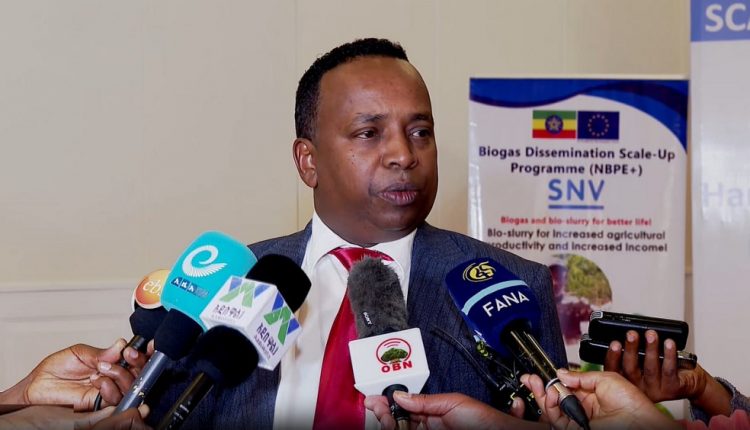Gov’t expanding biogas to replace adverse effects of solid biomass on health, environment
Addis Ababa, January 9, 2024 (FBC) – Clean cooking energy is less than 10 percent in Ethiopia and more than 90 percent of Ethiopians are still dependent for cooking on solid biomass that has adverse effects on the environment, Water and Energy State Minister Sultan Wali noted at the closing program of “Biogas Dissemination Scale up Programme” (NBPE+) held in Addis Ababa today.
The NBPE+ programme is a public private partnership commenced in 2017 at the federal, regional and district level funded by the European Union and the Government of Ethiopia.
The state minister said that access to clean cooking energy is very low across African countries.
Speaking of biomass fuels, he stated that using solid biomass fuels has adverse effect on the health of children and mothers as they are the ones who are directly involved in the cooking process.
Furthermore, it causes land degradation, soil erosion and ultimately agricultural productivity which lead to food insecurity.
With all these problems and consequences and advert effects, we cannot change and improve lives and livelihood of Ethiopians and Africans, he indicated.
Therefore “we should able to shift our dependency on solid biomass to clean cooking technologies. In this regard, biogas is one of the most important clean technologies we have in Ethiopia today.”
Ministry of Water and Energy has benefited more than 180,000 rural Ethiopians from this project, reduced about 2 million tons of carbon dioxide, and provided fertilizer for about 1,040 hectare of land.
As the project nears to end, I assure you that this programmme will continue and be scaled up in different parts of the country.
Agri Food Sector Lead and Programs Director of SNV Ethiopia Yetnayet Girmaw said SNV, partner of the ministry, is committed to ending energy poverty by ensuring that everyone has access to a modern clean energy service.
The overarching objective of the programme is to enhance the livelihood of farmers and their families in 9 Ethiopian regions. Simultaneously, it aims to curb the overexploitation of biomass cover in these regions, reduce greenhouse gas emissions, and mitigate indoor pollution.
“Biogas technology is one of the solutions in the energy sector that provides clean energy for both household as well as largest contributing to reducing home and environmental pollution, thereby improving the health of the society. It also reduces carbon emissions to the environment which is crucial tool to climate change mitigation and adaptation,” she added.
EU Delegation Green Deal Team leader, Roberto Schiliro said the program allows access to low income rural households to clean and sustainable energy as well as the production of organic fertilizer to crop production and income generation.
As the project comes to an end, the European Union remains very attentive and keen to support the development of local private sector in the area of agri food systems and productive use of renewable energy in general, the team leader stated.
This is in line with EU Green Deal strategy to achieve a carbon neutral economy by 2050.
“The government through its determined contribution has committed to install 160,000 digesters until 2030. It is an ambitious target but achievable target. In the goal we will succeed all together to facilitate the takeover from the private sector, the more this will be achievable one.”
The total funding of the programme from EU, according to ENA, was EUR 20.85 million, while the Government of Ethiopia contributed EUR 2 million.


